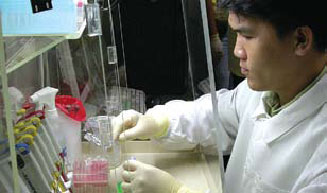Global Health Security: Global Disease Detection Centers

CDC’s Global Disease Detection Regional Center in Thailand built laboratory capacity across seven countries, enabling them to conduct new tests and respond more effectively to infectious disease threats.
The Global Disease Detection program (GDD) promotes scientific discovery by partnering with host countries to identify new health threats and reduce the burden of infectious diseases. GDD is CDC’s principal program for advancing the science behind global health security. With over a decade of experience between SARS and Ebola — and over 1700 outbreaks and public health emergencies responded to – the GDD program is critical to helping countries meet their commitments to the International Health Regulations and the Global Health Security Agenda.
As of today, GDD has supported over 50 countries through its 10 Centers worldwide. Centers work with countries to build and strengthen public health capacity. We do this through:
- Detecting and responding to emerging infectious diseases
- Developing a global workforce
- Enhancing laboratory systems
- Increasing preparedness and communication activities
- Addressing the animal and human interface responsible for zoonotic infections
- Conducting public health research